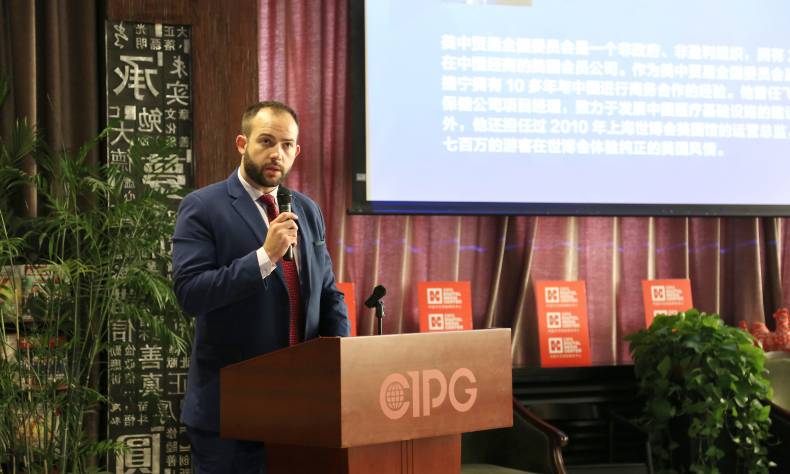
How American expert Jake Parker Sees Trump’s Visit to China: Trade Is the Priority Issue
Jake Parker, vice president of the U.S.-China Business Council, delivered a keynote speech at the seminar and exchanged views with other experts on issues including Sino-U.S. diplomacy, trade and development.
By Jake Parker
The Sino-US economic and trade relationship has always been the most sensitive issue between the two countries. China is pushing for greater economic reform. It is hoped that companies in China and the United States will share a more equal business and competitive environment. Neither of the two countries’ interests should be harmed.
On November 7 in Beijing, Digital Media Center (DMC) of China International Publishing Group (CIPG) hosted a seminar: “a New Era – a New Direction of China-U.S. Relations”. A number of senior experts and academics in Sino-U.S. diplomacy and economic and trade relations attended the seminar, and held in-depth discussions on several issues regarding the current relationship and future prospects for the two countries after the two leaders’ meeting, focusing on “What is the impact on Sino-U.S. relations, and how will it influence the situation in the Asia-Pacific region and the wider world?”
Jake Parker, vice president of the U.S.-China Business Council, delivered a keynote speech at the seminar and exchanged views with other experts on issues including Sino-U.S. diplomacy, trade and development.
The Sino-U.S. trade National Committee was established in 1973 and has offices in Beijing. Its role is to build a cooperative relationship between China and the United states. Parker emphasized that he does not speak for the American government; he would only elaborate his own views on Sino-U.S. relations.
President Xi Jinping and President Trump met in Mar-a-Lago, Florida in April this year.
They made very positive progress—they developed a “100 day plan”, and put forward some ideas for an improved mechanism of bilateral relations. All these achievements represent considerable progress in Sino-U.S. relations at a strategic and economic level. Before Trump’s state visit to China, they also had a breakout meeting during the G20 summit in Hamburg, Germany, in July.
Unfortunately, although the two leaders have already met twice before, according to our understanding the economic strategic dialogue between China and the United States seems to have reached a stalemate at the moment. This is related to Trump’s personality and the political issues he faces.
There are some pessimistic voices in Washington who think that negotiations with China are not conducive to U.S. strategic and economic interests. It is very difficult to make progress in the fields of economy and trade, and the prospect of making any degree of rapid progress in just a few months is simply not possible. At the same time, Washington is also emphasizing that China and the United States face other serious problems.
I think that Trump’s trip might be related to the business environment, and could result in major commercial and trade agreements, especially in the field of natural gas and oil, and trade in products exported from the United States to China.
The issue of Sino-U.S. trade is the number one priority and Trump’s trip would discuss the trade deficit between the United States and China.
During the visit, President Trump was expected to give President Xi a signal on economic and trade relations that America expects China to create a relatively fair business environment for American companies. If there is no substantive breakthrough in the problem of trade imbalance, then the United States will not rule out a punitive response.
The Sino-U.S. trade National Committee has been concerned about the competitive environment and the competitive position of American companies in the Chinese business environment. We are actually likely to see a more constructive and peaceful approach to reducing Sino-U.S. economic and trade friction.
As far as I’m concerned, China is pushing its own economic reform onto a more ambitious track. It is hoped that companies in China and the United States will share a more equal business and competitive environment. Neither of the two countries’ interests should be harmed, so as to facilitate the establishment of an orderly global business environment. At the same time, we do not want any distorted competition which could hamper the development of Sino-U.S. relations. We hope that Sino-U.S. relations will develop in a positive way so as to promote economic and trade cooperation between China and the United States.
 Facebook
Facebook
 Twitter
Twitter
 Linkedin
Linkedin
 Google +
Google +










